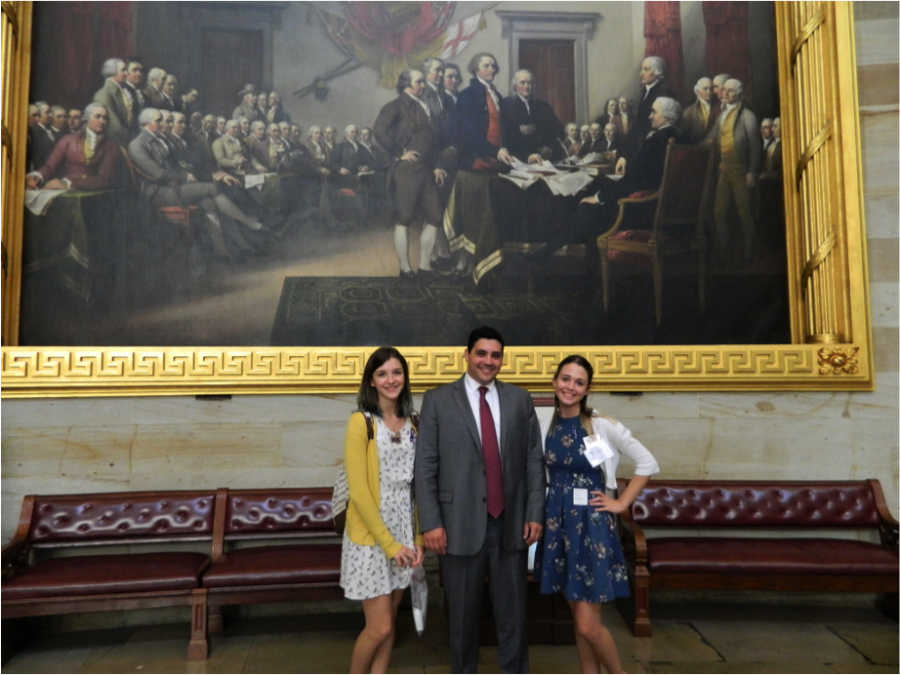Eating Disorder Coalition Capitol Hill Advocacy Day
Raising awareness of eating disorders and the impact on adolescents
Photo by C. Ricca
Brooke Shellman, Matthew Scott, and Julianna Ricca pictured in front of “The Declaration of Independence” painting by John Trumbull in the Capitol Building.
Not many high school seniors can say they’ve lobbied on Capitol Hill, so I am honored to have the privilege of saying I have. On October 5th, I accompanied my friend Julianna Ricca and her mom, Colleen, to a lobbying event on Capitol Hill for the Eating Disorder Coalition. We attended to share our personal stories on how eating disorders have impacted our lives to raise awareness and to pass legislation for those affected by disordered eating.
One of the most difficult challenges in raising awareness about eating disorders is breaking the current stigma surrounding them. Many people do not realize that in the United States alone, approximately 30 million people will suffer from an eating disorder in their lifetime, comprising of 20 million women and 10 million men. Eating disorders can affect people of all ages, genders, socioeconomic statuses, sexual orientations, races, and ethnicities, not fitting many people’s preconceived images of what someone with an eating disorder looks like. In addition to the large number of people affected, eating disorders have the highest mortality rate of all mental disorders. Despite these concerning statistics, only about one in three people receive the care they need.
The purpose of advocacy day was to develop greater awareness for and share our experience with eating disorders. We met in small groups with legislative assistants of senators and congresspeople to achieve our purpose through telling our stories. My personal connection with eating disorders is through Julianna. For most of her life, Julianna has been struggling with anorexia nervosa. I was unaware of what she was experiencing until about a year and a half ago. When I first started recognizing symptoms of her eating disorder, I felt apprehensive with approaching her about it. I feared that I would lose her as a friend if I talked to her about what I had noticed. However, I decided to speak with her guidance counselor because I learned how life-threatening eating disorders are. At first, Julianna admitted she was mad at me for having said something, but after a while she forgave me because she recognized she wanted to recover. I’m glad that Julianna has been willing to share her story throughout her recovery because she has played a significant role in raising awareness for eating disorders. She has already organized a walk through the National Eating Disorder Association (NEDA), raising approximately $3,000 with the help of her team. I am proud of Julianna for how much she has accomplished so far, and what she will continue to do for the future. She intends to major in psychology and attain a career with NEDA to continue her efforts.
In addition to sharing our personal stories about eating disorders, we advocated to pass legislation regarding eating disorders. The issue we addressed was in response to the removal of questions pertaining to eating behaviors on the CDC’s Youth Risk Survey in 2015 to be replaced with substance abuse questions. We explained that while it is important to assess adolescent risk of substance abuse, it is vital to survey eating disorders to recognize early symptoms and provide adequate treatment for people. The legislative staffers concurred with the importance of eating behavior questions on the survey; however, legislation must be passed before changes can be made. Additionally, we advocated that the government further recognizes and promotes National Eating Disorder Awareness Week at the end of February to decrease stigma surrounding the illness. Once again, the staffers received the information with open minds, so hopefully changes in the government will occur to further support the eating disorder community.
At the end of the event, it turned out to be a successful day. We felt a sense of accomplishment because our voices were heard, hopefully resulting in positive changes. In addition to advocating, our group was granted a private tour of the Capitol Building by legislative assistant Matthew Scott, which was a pretty awesome ending to the day. Overall, it was a wonderful, empowering experience that I would not have wanted to miss.







Sam • Nov 17, 2017 at 8:47 pm
An issue near and dear to my heart, thank you for bringing this to light in our paper. Also, will always respect Julianna’s activism for awareness and recovery.